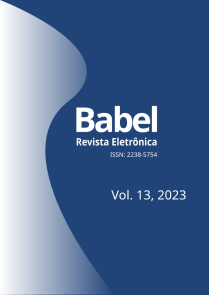The concept of language teaching approach from a complex perspective
DOI:
https://doi.org/10.69969/revistababel.v13i.17493Keywords:
Language Teaching, Language Teaching Approach, Complexity TheoryAbstract
Language Teaching scientific field has always been involved in the (re)creation and/or (re)categorization of terms and concepts (cf. ANTHONY, 1963; ALMEIDA FILHO, 1997; BORGES, 2009, 2010, 2016; RICHARDS; RODGERS, 2014). One construct – if not one of the most discussed conceptions in this area – is the Language Teaching Approach. Term intrinsically aligned (explicitly and/or implicitly) to the choices of procedures for teaching. In this context, I aim to revisit this concept and re-conceptualize it in the light of Complexity Theory (LARSEN-FREEMAN, 1997; LARSEN-FREEMAN; CAMERON, 2008; BORGES; SILVA, 2016). To do so, I used qualitative-interpretative bibliographic research. As a result, I defined the Language Teaching Approach as a theoretical pattern of language teaching, emerging in the interaction of eight agents: language conception, learning conception, second language acquisition theory, language competence, language skill, teaching unit, learner conception, and teacher conception.
Downloads
References
ALMEIDA FILHO, J. C. P. A Abordagem orientadora da ação do professor. In: ALMEIDA FILHO, J. C. P. (org.). Parâmetros atuais para o ensino de português língua estrangeira. Campinas, SP: Pontes, 1997, p. 13-28.
ANTHONY, E. M. Approach, method and technique. English Language Teaching, v. 17, p. 63-67. 1963.
BARANHUKE Jr., C. F. Ensino Complexo de Línguas Adicionais: Um Atlas Conceitual de Rotas Teórico-Didático-Metodológicas. 2021. Dissertação (Mestrado em Estudos da Linguagem) - Universidade Estadual de Ponta Grossa, Ponta Grossa, 2021.
BERTALANFFY, L. V. Teoria geral dos sistemas. Petrópolis, RJ: Vozes, 2009 [1968].
BORGES, E. F. V. Um modelo caótico de desenvolvimento reflexivo da profissionalidade de professores de línguas. ReVEL, v. 14, n. 27, p. 364-388. 2016.
BORGES, E. F. V. Metodologia, abordagem e pedagogia de ensino de língua(s). Linguagem & Ensino, v. 13, n. 2, p. 397-414. 2010.
BORGES, E. F. V. Uma reflexão filosófica sobre abordagens e paradigmas na constituição da subárea Ensino-Aprendizagem de LE/L2 na Linguística Aplicada. 2009. Tese de Doutorado. Faculdade de Educação da Universidade de São Paulo, 2009.
BORGES, E. F. V.; SILVA, W. M. Entrelaçamento de temas na compreensão de sistemas caóticos. In: SILVA, W. M.; BORGES, E. F. V. (org.). Complexidade em ambientes de ensino e de aprendizagem de línguas adicionais. Curitiba: CRV, 2016, p. 241-260.
HOLLAND, J. H. Hidden order: how adaptation builds complexity. Reading, MA: Addison-Wesley, 1995.
HOWATT, A. P. R.; WIDDOWSON, H. G. A history of English language teaching. Oxford: Oxford University Press, 2004.
KUMARAVADIVELU, B. Toward a postmethod pedagogy. TESOL Quarterly, n. 35, p. 537-60. 2001.
KUMARAVADIVELU, B. The post-method: (E)merging strategies for second/foreign language teaching. TESOL Quarterly, n. 28, p. 27-48, 1994.
LAKOFF, G; JOHNSON, M. Metaphors we live by. In: O’BRIEN, J.; KOLLOCH, P. The production of reality. Essays and readings on social interaction. London: Pine Forge Press, 2001, p. 124-134.
LARSEN-FREEMAN, D. Complexity theory: The lessons continue. In: ORTEGA, L.; HAN, Z. H. Complexity theory and language development: In celebration of Diane Larsen–Freeman. Amsterdam: John Benjamins. 2017, p. 11-50.
LARSEN-FREEMAN, D. From unity to diversity… to diversity within unity. Reflections: English teaching forum, n. 2, 2012, p. 22–26.
LARSEN-FREEMAN, D. Chaos/Complexity science and second language acquisition. Applied Linguistics, v. 18, n. 2, 1997, p. 141-165.
LARSEN-FREEMAN, D.; CAMERON, L. Complex systems and applied linguistics. Oxford: Oxford University Press, 2008.
LEFFA, V. J.; IRALA, V. B. O ensino de outra(s) língua(s) na contemporaneidade: questões conceituais e metodológicas. In: LEFFA, V. J.; IRALA, V. B. (org.). Uma espiadinha na sala de aula: ensinando línguas adicionais no Brasil. Pelotas: Educat, 2014, p. 21-48.
MANDELBROT, B. Fractal geometry: what is it, and what does it do? Proc. R. Soc. Lond., p. 3-16. 1989.
MANDELBROT, B. The fractal geometry of nature. New York, W. H: Freeman and Company, 1988.
MORIN, E. Introdução ao pensamento complexo. Lisboa: Instituto Piaget, 1995.
OLIVEIRA, L. A. Aula de inglês: do planejamento à avaliação. São Paulo: Parábola Editorial, 2015.
PRABHU, N. S. There’s no best method – why? TESOL Quartely, v. 24, n. 2, p. 161- 176. 1990.
RICHARDS, J. C.; RODGERS, T. Approaches and methods in language teaching. Cambridge: Cambridge University Press, 2014.
Published
How to Cite
Issue
Section
License
Copyright (c) 2023 Babel: Revista Eletrônica de Línguas e Literaturas Estrangeiras

This work is licensed under a Creative Commons Attribution-ShareAlike 4.0 International License.
Os autores detém os direitos autorais sem restrições, porém ao submeter os originais, concordam em transferir a este periódico os direitos da primeira publicação. Isto deve ser informado em caso de nova edição do texto. As produções que derivarem deste material, devem obrigatoriamente citar a fonte. Os textos publicados nesta revista, salvo indicações contrárias, encontram-se sob uma licença Creative Commons Atribuição 4.0 Internacional.

